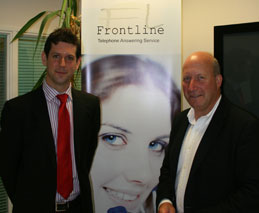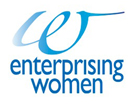- Resources for mentees
- Useful information
- Case studies
- Construction & property
- Consumer products
- Creative services
- Education & training
- Hotels & restaurants
- IT & telecoms
- Manufacturing
- Professional services
- Renewable energy
- Resources for mentors
- Other resources
- Regional events
- Best Practice Toolkit

Trust is the basis of successful mentoring
When the responsibility of running the family business fell squarely on the unsuspecting shoulders of David Jones, he turned to a well-liked and highly respected Mentor to help him find the resources within himself that he needed.
The way we were
David was happy to make his career as part of the company, Frontline Telephone Answering Ltd, founded by his father. He had come up through the ranks, working in IT and Operations, but when his step-mother (and company FD) faced serious illness, she and his father effectively withdrew from the business overnight.
It happened about three years ago, at a time when the business was doing well and before the credit crunch hit home. David’s initial focus was on keeping the business going, but as the economic climate turned stormy, he realised he needed to dig deeper within himself to ensure that he could steer the company, not just to keep it stable, but so that it could progress. His father, the entrepreneur, had been a fantastic example, but the new Managing Director, had to develop his own style, and do it fast.
Frontline Telephone Answering Ltd employs 80 operatives. They have 300 clients including DHL, the NHS, the Forestry Commission and Barclays Capital. Frontline also provides outsourced services for other organisations and is developing international contracts, for example in Australia, to take advantage of the time difference. Frontline offers more than a telephone answering service. In the new world of hi-tech communications emails, texts and alerts are all part of effective communications, and all the operatives at Frontline are experts at communicating. However, they needed to know where they were going.
Taking action in face of the challenge
David was painfully aware that he was in danger of drifting and that he had to quickly find his way to become a leader in the business. He was in exactly the right place when a recommendation from Business Link led him to Mentor-net. When David met the Programme Director, Rachel Cheetham, she was able to introduce him to John Sephton, an ex Royal Navy Commander and Workforce Development Specialist, who was willing to volunteer to become David’s Mentor in March 2010.
David was immediately impressed, and has found John very personable and easy to get on with.
“John is an awesome guy,” said David. “He has vast experience and his leadership style is very distinctive. He has a fantastic manner and I can imagine how he would be able to inspire the confidence and trust he would have to have in a life and death military situation.”
“Running a business may not be a life and death situation but the implications of making the wrong decisions can be critical,” he continued, “John has helped me to formulate my vision and to work out my strategy for achieving it, setting goals and targets along the way.”
From John’s perspective, he was convinced from the outset that there was a real opportunity to assist David. He noticed that when David showed him round the business at their first meeting there was clear engagement and a readily apparent commitment from his people. John felt David already had a determined, yet highly personable, leadership style. The task in hand was to help David recognise it in himself.
How does Mentoring work?
John set up regular, structured, monthly meetings with David. They both realised that they would have to be very open-minded to make the mentoring relationship work. It was both challenging and rewarding for both of them. Initially, John focused on leadership styles and the traits of particular leaders, what makes them effective, and how these principles might be put into practice in the workplace. David responded positively to John’s approach and began to open up about the business. John listened, and told a few stories about his own experiences. At this stage he realised that the focus was going to shift from David to his people. “That’s a key point about mentoring,” explained John. “The relationship between Mentor and Mentee has to evolve, and it mustn’t become static. Trust is the Mentor’s golden coin.”
The two worked steadily through a series of people related business topics. As they talked they found their thinking often aligned, and their connection has since developed to such a stage that David is aware that John is one of the few people with whom he can be perfectly candid. “I feel as if John knows my character well,” explained David. “He understood my business challenges very quickly, especially the importance of people to the business. He is aware of where I want to be, and has helped me to find my direction and define my vision. In between meetings he continues to research for me, and sends me downloads, charts and messages by email.”
In one instance John assisted David through a very difficult staffing issue, talking through the detailed preparation for the meeting and keeping in touch by email with impromptu messages of support, emphasising that leadership was the key.
Their relationship is strong and is characterised by a deep mutual respect. So much so, that at a recent meeting John raised one of his own business issues with David. “This development indicates the power of mentoring because it’s not just one way. We are learning from each other and this is hugely rewarding for both of us,” he said.
Introducing ‘battle rhythm’ to business
The naval influence has been strong, and David has even taken his management team away for a developmental day to the historic naval dockyard at Portsmouth. This was an important opportunity to inspire the team by communicating the vision and gaining buy-in to the targets.
“The changes I wanted to implement have been a real culture shock to this organisation,” says David. “We are shaking ourselves out of being a small family business into a ‘proper’ business, and leadership is key to our success.”
So far, all the managers at Frontline have been developed internally from the workforce of operatives. This has the advantage that they all understand the business inside out. Now they are learning new business procedures, and setting long term goals focusing on four different segments of activity; these are specialised care, IT, maintenance and customer service. They are also thinking about their own leadership responsibilities.
David said: “When I was talking to John about the successful habits of business people and my ambitions for my own staff, he said this sounded like ‘battle rhythm’. I had to ask him what this was.”
John explained that David’s planned offensive had strong similarities with military campaigns. When going into combat communication becomes of paramount importance. Knowing the objective and having vision is vital to success and spreading this throughout the team means everyone is on board, well informed and empowered to act. In “Navy Speak” this is known as “The Buzz”.
“The day at Portsmouth had a real impact,” said David. “We spent time discussing our aims and setting our goals. We drew parallels with a battle scenario in our quest to become the best contact centre there is and to beat all our competitors. Then we had a go at some military based activities such as climbing walls, using GPS to hunt down solutions, even flying a helicopter – blind folded!”
Was it worth it?
David and his management team, are now working towards achieving their vision of becoming the ultimate contact centre of choice, to both UK and overseas companies, so that customers can ‘get through’, especially outside of normal working hours. They have taken on the need to systematise their day to day routine tasks to allow them more time to focus on achieving their 90-day and annual goals, whether this is to achieve a greater margin or to increase net profit. They also have learned to aspire to leadership. They recognise that one of their strengths, as they increase in size, is their ability to retain small teams with specialist knowledge.
“My experience of having a Mentor has been fantastic,” concluded David. “I really didn’t expect such great value for money. I have engaged business coaches before, but this is different. My FD is over the moon, because we have seen such tangible benefits to the business as we are implementing our new ways of working. I would recommend anyone who is at a cross-roads in their business to consider signing up.”
From John’s point of view he greatly admires how much David cares for his people. He sees this as a refreshing and enlightening approach from a new generation business leader. “People are Frontline and Frontline means People,” is their catchphrase. As a result of David and John’s relationship Frontline are introducing some of the most contemporary people management techniques available, which undoubtedly will have a positive impact and contribute directly to the future growth and sustainability of the business.
And finally, they are not going to stop there. The initial brief may have been to look at leadership, but future discussions are going to explore areas such as quantifying and managing business risk. This proves that mentoring is all about business evolution!







